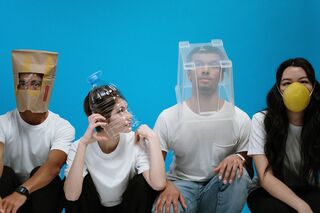Anxiety
Navigating the Anxiety of Post-Pandemic Socializing
How to recreate a social life after a year of social distancing.
Posted June 15, 2021 Reviewed by Abigail Fagan
Key points
- It's natural for people to struggle with social interactions more now than they did before the pandemic.
- Social rules and norms are being renegotiated, which can trigger social anxiety.
- To ease into the post-pandemic world, people should respect their needs, communicate those needs to others, and be patient with themselves.
This article was written by Emma Eskander, MS, and Kevin Foss, MFT.
With vaccines rolling out, many are seeing their worlds open up again. Workplaces are reopening, students are returning to the classroom, and family members are being reunited at long last. With our social calendars refilling, an unexpected challenge has arisen for many: a surge in social anxiety.
Social anxiety may arise for a number of reasons in this unique grand re-opening of our lives. The social norms, or unwritten rules that tell us what is normal in interactions, are being rewritten. We find ourselves faltering over whether our dinner partner is comfortable eating indoors, shaking hands, or hugging.

We may still be determining our own comfort with those activities. This blurring of expectations can lead to uncertainty and anxiety over whether we will be rejected (“What if I try to hug him and he moves away?”) or feel shame about our own boundaries (“What if they think I am rude for leaving my mask on?”). Meanwhile, all of these details of social negotiation are still taking place during a global pandemic and the continued threat to our health that COVID-19 represents. Add onto these issues the fact that we feel out of practice talking to anyone except our reflection, and you have a perfect storm for anxious feelings.
What Is Social Anxiety Disorder?
Many of us may feel a bit clunky as we try to reintegrate old and new social norms and flex social muscles that may have atrophied. Navigating our mumbling-mask conversations and seeing people who have been out of sight for a year may naturally elicit some weird feelings.
Social Anxiety Disorder (SAD) is an anxiety disorder in which someone fears judgement, criticism, or failure in social situations. Similar to Obsessive Compulsive Disorder (OCD), a SAD sufferer will experience intrusive thoughts of unwanted, or even catastrophic, social and interpersonal outcomes that cause a tremendous sense of anxiety, fear, or discomfort. To ward off any unwanted outcome, to feel better, or make sure that they are still ok, someone with Social Anxiety will avoid social situations, ask for reassurance, exhaustively plan out their actions, mentally review, or even engage in substance use to avoid feeling these unwanted feelings.
Social Anxiety in Everyday Life

For people with Social Anxiety Disorder, social interactions bring with them the fear of embarrassment and humiliation. Situations like engaging in conversation, feeling observed and criticized by others, and performing in a social setting can result in high levels of fear and anxiety. People with SAD find their ability to go about life—engaging in work, social interactions, or talking to strangers—impacted by their fear.
People with SAD might experience intrusive thoughts about embarrassing things they said or did, even things from long ago. Thoughts may include "mind reading" by assuming negative things other people think about them, or what they did or said. People with social anxiety may find themselves anticipating conversations before they happen (trying to prepare and avoid embarrassment or conflict) or reviewing conversations and interactions after they occur (trying to review everything that happened and reassure themselves that they didn’t do anything embarrassing).
Others may feel the urge to compulsively apologize in case they were potentially offensive, lie to avoid feared negative outcomes, or resist asking for things they want in order to avoid hearing a "no." It’s not surprising that for some, it feels easier to avoid social situations altogether.
Treatment for Social Anxiety Disorder
Cognitive Behavioral Therapy (CBT) and Exposure and Response Prevention (ERP) are research-backed approaches for treating social anxiety. Through the combination of these treatments, social anxiety sufferers can learn to challenge some of their unhelpful assumptions around social interactions and find new ways to engage with the discomfort of social settings.
Little by little, through repeated exposure and intentional engagement in uncomfortable and anxiety-provoking situations, even COVID anxiety, our brains can re-learn how to engage in social encounters, and we can feel free to practice less self-protection. What’s more, we gain confidence that what we are most afraid of happening is unlikely, if not highly unlikely.
Dealing with Social Anxiety After the Pandemic
Social anxiety can feel like an impossible barrier, but there are ways to face this fear and get back to a meaningful life in a community. Many people find psychotherapy to be helpful in dealing with social anxiety. In addition, adjusting the ways that you interact with your social anxiety, with others, and with your alone time can help.
So, now that you’re ready to switch out your sweatpants for work pants and brave the off-line world again, you might be wondering where to start. The following are some simple things you can do to start re-integrating with friends, co-workers, and general society in a post-pandemic life.
1. Accept and Appreciate Where You Are
Remember: you weren’t born knowing how to talk to people, but you learned, and now is a great time to re-learn! It may feel like your level of social anxiety is a fixed feature, but in reality, there is a great potential for rewiring and learning new ways of engaging with others. While we may want to adjust some of the anxiety levels, our caring for how others think of us is biological and natural. In and of itself, feeling anxiety about the gaze of other people is not a bad or dangerous feeling, although it may feel uncomfortable and unpleasant.
While in some ways, the resurgence of parties and social obligations may feel daunting, it is also a sign that our world is persevering through major challenges together. Accepting some level of social anxiety means being willing to tolerate anxiety in order to enjoy the gift of being around others. Anxiety and enjoyment are not mutually exclusive, and by opening ourselves up to feeling anxiety, we are also giving ourselves the opportunity to enjoy other people.
2. Start With Manageable Goals
You don’t have to go from a solid year of pandemic isolation straight to giving a live TED talk. Starting with manageable goals can help you build your confidence. Acclimating to social situations gradually and relearning how to tolerate the discomfort of interaction is foundational for social anxiety treatment. Think about what kinds of social interactions are meaningful for you and an important part of your life and rank them from least-to-most anxiety inducing. Then, one by one, do them.
3. Avoid Self-Medicating with Alcohol or Substances

It might seem like an easy fix to cope with anxiety via drinking or taking other drugs. While loosening up via substances might feel like a solution in the short-term, it isn’t a great way to deal with social anxiety in the long run.
One way intoxication can backfire is by adding to anxiety after the fact. Under the influence, we may do or say things that, once sober, we regret, and this can also raise our anxiety. Aside from these reasons, using substances to decrease our anxiety can get us into an unhelpful pattern. While facing a situation sober may seem daunting, you are doing your future self a favor.
4. Communicate Your Comfort Level and Needs
With trustworthy friends, it can be worthwhile to talk openly about how you are feeling and the challenges you are facing as you reenter society. A little bit of conversation can also go a long way in setting clear boundaries regarding COVID anxiety comfort levels and needs. While it may feel weird to have to negotiate these terms of socializing, these questions will be part of our foreseeable future, so practicing them will help them become natural. Some of these questions and statements may look like:
“Are you comfortable with indoor dining, or should we be looking for somewhere with a patio?”
“I’d still like to eat outdoors. Do you know of any nice places with space heaters?”
“Are you hugging, or fist-bumping?”
5. Temper Your Expectations
Some friends or family members will not be on board with boundaries or questions because they may have doubted or outright disbelieved the existence and severity of the pandemic. Be cautious and judicious about who you spend time with as they may be critical of your precaution or not be willing to let you inch yourself back into the metaphorical social pool.
6. Enjoy Your Alone Time
It’s ok to have downtime in between social experiences to regroup before you go out into the world again. For some, the time prior to a social interaction can be especially challenging because they may feel the urge to prepare for the interactions by prepping conversation topics or playing through scenarios in their head. Others may feel "hangovers" of social anxiety after spending time with others, agonizing over every interaction and overthinking everything they said or didn’t say. These can be exhausting experiences.
By knowing, and being honest about, which situations spike your anxiety, you can anticipate them and intentionally focus on other thoughts or activities when you normally would be overcome by anxiety. This could look like planning to watch a movie when you get home, or playing fun, loud music in the car on your drive. Find something that helps you get out of your head and into the moment.
7. Give It Time
It can be easy to feel discouraged when a social interaction doesn’t feel like it went well, or when we notice our anxiety present in a social setting. Being in relationships is messy and weird and part of being human. Therefore, it’s ok for your anxiety to show up. Things probably won’t feel normal overnight, but continuing to show up in your social circles and having patience with yourself are two key ingredients to gaining more comfort and getting back to a new normal.




